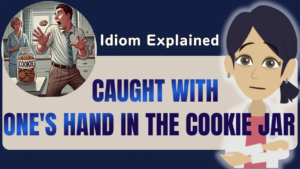Ever felt frustrated about something you can’t change? This idiom might be exactly what you need.
To waste time worrying about mistakes or accidents that have already happened and cannot be changed.
Have you ever been puzzled by someone saying “Don’t cry over spilled milk” when no dairy was involved?

This age-old reminder has nothing to do with actual milk, but instead teaches us not to dwell on irreversible mistakes or mishaps.
Embracing this wisdom helps shift your mindset toward focusing on what you can control, rather than worrying about what you can’t change. It’s a practical approach to life’s inevitable setbacks.
Why This Idiom Matters
1. Fosters a Forward-Looking Mindset
Dwelling on errors often leads to stress. If you’ve ever spilled a drink before an important event, you know the feeling.
By remembering the phrase cry over spilled milk, you’ll gently remind yourself or others that worrying about a past slip-up rarely helps. Accept the situation, clean up if necessary, and think about your next move instead.
2. Enhances Cultural Fluency
Native English speakers use idioms frequently, sometimes without realizing it. Understanding common phrases like cry over spilled milk allows you to catch the nuance of conversations.
This not only helps with comprehension but also lets you respond naturally and confidently.
Spilled Milk Meaning
When someone says, “Don’t cry over spilled milk,” they’re cautioning you not to be upset about something that has already happened and cannot be changed.
The image is a simple one: if a glass of milk has tipped over, there’s no point in crying about it because the milk is gone. You can’t scoop it up and put it back into the glass. Instead, you clean the spill and move on.
A Quick Anecdote
Imagine you’re at a party, and you knock over a glass of wine. A friend cheerfully exclaims, “Don’t cry over spilled milk!” You glance at them with confusion, thinking, “But there was no milk in the glass, it was wine!”
In that moment, you learn that the expression has little to do with actual dairy products. It’s about letting go of regrets or accidents that are impossible to undo.
Note on Accuracy
The definition here is consistent with mainstream English usage: it’s about not lamenting over irreversible events.
If you encounter the literal idea of someone crying about real spilled milk, rest assured that they’re either being humorous or deliberately mixing up the idiom.
Everyday Idiom Examples
1. Failed Test
- “I know you failed the test, but there’s no use crying over spilled milk.”
- This reminds the listener that spending too much time being upset won’t change the result. Instead, focus on studying for the next exam.
2. Lost Phone
- “I lost my phone, but I’m not going to cry over spilled milk.”
- Here, the speaker acknowledges the mishap yet chooses to move forward, perhaps by looking for a replacement or locating a spare device.
3. Missed Train
- “You missed the train, so don’t cry over spilled milk.”
- This phrase encourages letting go of frustration about a missed ride, reminding you to plan the next step instead of brooding over what’s done.
4. Spilled Coffee
- “I spilled my coffee, but there’s no point in crying over spilled milk. I’ll just make another cup.”
- Even a minor mishap like spilling a favorite morning brew can become less stressful if you remind yourself to move on.
Historical Insights
This idiom dates back centuries. In older English, you might find proverbs like “No weeping for shed milk,” which conveyed a similar idea.
Over time, this concept became cry over spilled milk in modern English. Historically, it highlights the universal tendency to regret the past, only to discover that remorse doesn’t fix the problem.



Interestingly, this expression (or near equivalents) appears in other languages too.
In Spanish, for instance, there’s “No llores por la leche derramada,” which conveys the same idea of accepting mistakes and focusing on what lies ahead.
It’s proof that people across cultures share the same lesson: once something is gone, lamenting it changes nothing.
Similar Expressions
It’s easier to remember an idiom’s meaning when you compare it to other phrases. Here are some common English expressions that reflect a similar mindset:
1. Don’t make a mountain out of a molehill.
- This warns against exaggerating small issues into bigger problems. If you spill water on the table, deal with it calmly instead of acting like disaster has struck.
2. Don’t sweat the small stuff.
- A reminder that not every tiny issue deserves serious attention. If you accidentally send an email with a typo, there’s usually no need to panic.
3. Let bygones be bygones.
- Suggests you should let past issues remain in the past. It’s often used when people want to mend relationships and move forward without grudges.
4. Water under the bridge.
- Emphasizes that a troublesome event is already in the past and isn’t worth revisiting. Much like a river’s flow, it’s gone and won’t return.
5. It’s not the end of the world.
- Used to calm someone who’s acting as though a small mistake is a major catastrophe. Life continues, even if something didn’t go according to plan.
Opposite Expressions
Sometimes, it helps to know the reverse idea to fully grasp an idiom. The following phrases stand in contrast to cry over spilled milk, often magnifying issues instead of accepting them and moving on:
1. Make a big deal out of something
- This occurs when someone overreacts to a minor event. If a friend turns a tiny mishap into a monumental crisis, they’re doing the exact opposite of letting go.
2. Worry about everything
- For individuals who stress over details that others might consider insignificant. Instead of a calm outlook, they lean toward anxiety and panic.
3. Dwell on the past
- People who constantly revisit old mistakes or regrets. Rather than acknowledging what happened and looking ahead, they can’t seem to let things go.
4. Hold a grudge
- When someone refuses to forgive or forget, they’re choosing resentment. This is the opposite of the forgiving attitude suggested by cry over spilled milk.
5. Catastrophize
- This means viewing every hiccup as a massive dilemma. If a person sees a small spill as a sign of a terrible day, they’re not embracing the idiom’s advice at all.
Idiom Usage Tips
1. Use It in Comforting Contexts
If a friend is upset about a minor accident, you might say, “Hey, don’t cry over spilled milk.” This can gently shift their attention away from the problem and encourage them to think about a solution or simply move on.
2. Choose the Right Tone
While this idiom is useful, be aware of your tone. In a light situation, it can bring humor. In a serious one—like losing a job—it might need a more empathetic delivery.
3. Offer Alternatives
Sometimes people misunderstand this idiom. If you suspect someone might take it literally, try rephrasing with something like, “Don’t stress over what you can’t change,” or “It’s not worth losing sleep over this.”
4. Keep It Friendly and Approachable
Avoid sounding dismissive. The point is to encourage resilience, not to belittle someone’s feelings. By using a calm voice and a reassuring smile, you convey support rather than judgment.
Real-Life Anecdote
Picture a busy morning: you’re hurrying to a meeting and spill coffee on your shirt. Initially, you feel embarrassed and frustrated.
Then you remember: “Don’t cry over spilled milk.” Instead of letting the mishap ruin your day, you change into another shirt, clean up quickly, and dash off to your appointment.
Later, you share the story with colleagues. Everyone has a laugh, and someone recalls a similar incident where they spilled sauce on their favorite tie.
These stories highlight how focusing on a solution, instead of lamenting the spill, makes a big difference. By choosing not to dwell on what happened, you preserve both your composure and your positive attitude.
Extra Learning Examples
1. I missed the sale at my favorite store, but there’s no point in crying over spilled milk.
Focus on the next opportunity to get a deal or simply accept that you saved money by not shopping.
2. My colleague deleted a file by mistake, but it was no use crying over spilled milk.
We recreated the file from backups, and the team learned to be more careful with important documents.
3. My favorite TV show got canceled, but I’m not going to cry over spilled milk.
Instead of fixating on the cancellation, try discovering a new series that might be even better.
4. I dropped my ice cream, yet I refused to cry over spilled milk.
Sometimes you just have to laugh and get another scoop if it’s an option.
5. Our team lost the game, but there’s no point in crying over spilled milk.
We reviewed the footage, identified mistakes, and practiced harder for the next match.
Spilled Water Tale
Occasionally, you might hear people modify the idiom for comedic effect. Imagine a family picnic where your uncle knocks over a pitcher of water.
He grins and says, “Don’t cry over spilled water—at least the grass gets a drink!” Everyone laughs, and the focus shifts from a minor accident to a playful moment.
This variation reminds us that the principle remains the same regardless of what’s actually spilled.
Pop Quiz: Check Your Idiom Skills
Cry Over Spilled Milk

Summary
- Key Point: The idiom cry over spilled milk reminds us not to agonize over events that can’t be reversed. It’s about resilience, a healthy mindset, and staying focused on what lies ahead.
- Importance of Idioms: By incorporating common expressions into your English, you’ll become a more confident speaker. You’ll also gain insights into the culture behind the language.
- Moving Forward: Whether you literally spill a drink or face any unexpected setback, apply this idiom as a helpful nudge: don’t linger on what’s done. Look to the next step, solution, or possibility.
“Cry over spilled milk” is more than a warning—it’s a reminder to stay optimistic when things go wrong.



Life isn’t always in our control, but with the right mindset, setbacks can become stepping stones.
👉 Bookmark this post and share your thoughts in the comments!









Comment